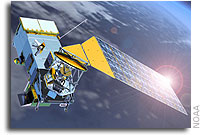Opening Statement by Rep. Boehlert at House Science Committee Hearings on the NPOESS IG Report

I want to welcome everyone here this morning to this important hearing. We had a hearing on the NPOESS program back in November, and we will be holding another one in June, after the results of the Nunn-McCurdy certification process are released. NPOESS is a crucial national undertaking and this Committee will exercise continuing oversight of it.
No doubt we will have some disputes at today’s hearing, but I think there are two points with which everyone on this dais and both of our witnesses can agree. The first point is that it is absolutely vital that the NPOESS program succeed. NPOESS will provide our “eyes in the sky” for both civilian and military weather forecasting, and we cannot afford to be stumbling around blind. A degraded satellite system will cost lives, whether those are the lives of civilians who do not get the best information about approaching storms, or military personnel who lack information on weather patterns that could affect the success of their operations.
And the second point is that the NPOESS program is not succeeding right now. It is not achieving its technical goals. It is at least 17 months behind schedule, raising the specter of a gap in satellite coverage. And it is as much as $3 billion over budget – $3 billion; the entire budget of NOAA, by way of comparison, is under $4 billion. The NPOESS program is, to be colloquial, totally out of whack.
So clearly, changes are desperately needed for NPOESS to succeed, and succeed it must. Our main purpose in holding this hearing is to ensure that the needed changes are made to the NPOESS program to get it back on track. And we also want to ensure that the mistakes of NPOESS are not repeated in NOAA’s next big satellite procurement, GOES-R.
Now I know that we will not be able to discuss all the changes needed in NPOESS in detail today because they are still being considered as part of the Nunn-McCurdy review. But that should not prevent us from hearing clearly whether NOAA itself agrees with the Inspector General’s (IG) analysis of what went wrong and his suggestions for what needs to happen now to fix the program.
Unfortunately, I find a certain defensiveness and lack of clarity in parts of Admiral Lautenbacher’s written testimony, as I did in NOAA’s written response to the IG report. I hope we can get direct answers in our proceedings today.
What I want to hear clearly is an admission that NOAA – and that means NOAA’s leadership right up to the top – made mistakes, can identify those mistakes, and has plans to fix those mistakes. Otherwise, it’s harder to place credence in general promises that the Nunn-McCurdy process will take care of everything.
I am made uneasy by statements like the one on page 3 of Admiral Lautenbacher’s testimony that “EXCOM has been actively and directly involved in the oversight and management of NPOESS” when the information provided by the IG and the actual performance of the program indicate otherwise. I am made uneasy when the NOAA testimony never takes a position on the IG’s conclusion that both the potential and earned contract award fees were excessive.
We need to have a very frank and open discussion if this program is to get back on track.
I am not suggesting that anyone was not trying to do their best in running the NPOESS program. But I am suggesting that previous management procedures clearly were not successful. And I am not suggesting that I don’t see progress in the way that NOAA is approaching NPOESS. But I am suggesting that with a program this essential and this plagued by problems, we need to be sure that NOAA’s leadership is fully committed to making every change necessary to ensure programmatic success. We understand that NPOESS is an extraordinarily complex program technically and organizationally – probably too complex, in retrospect. But as the IG points out, that’s only a reason to redouble efforts to manage it closely.
I look forward to an open discussion today that will help inform this Committee as we continue to oversee this complex program. We want to our part to ensure that, at some point in the future, this Committee’s NPOESS hearings can be about the remarkably useful data our nation is receiving from orbiting NPOESS satellites.
Mr. Gordon.








